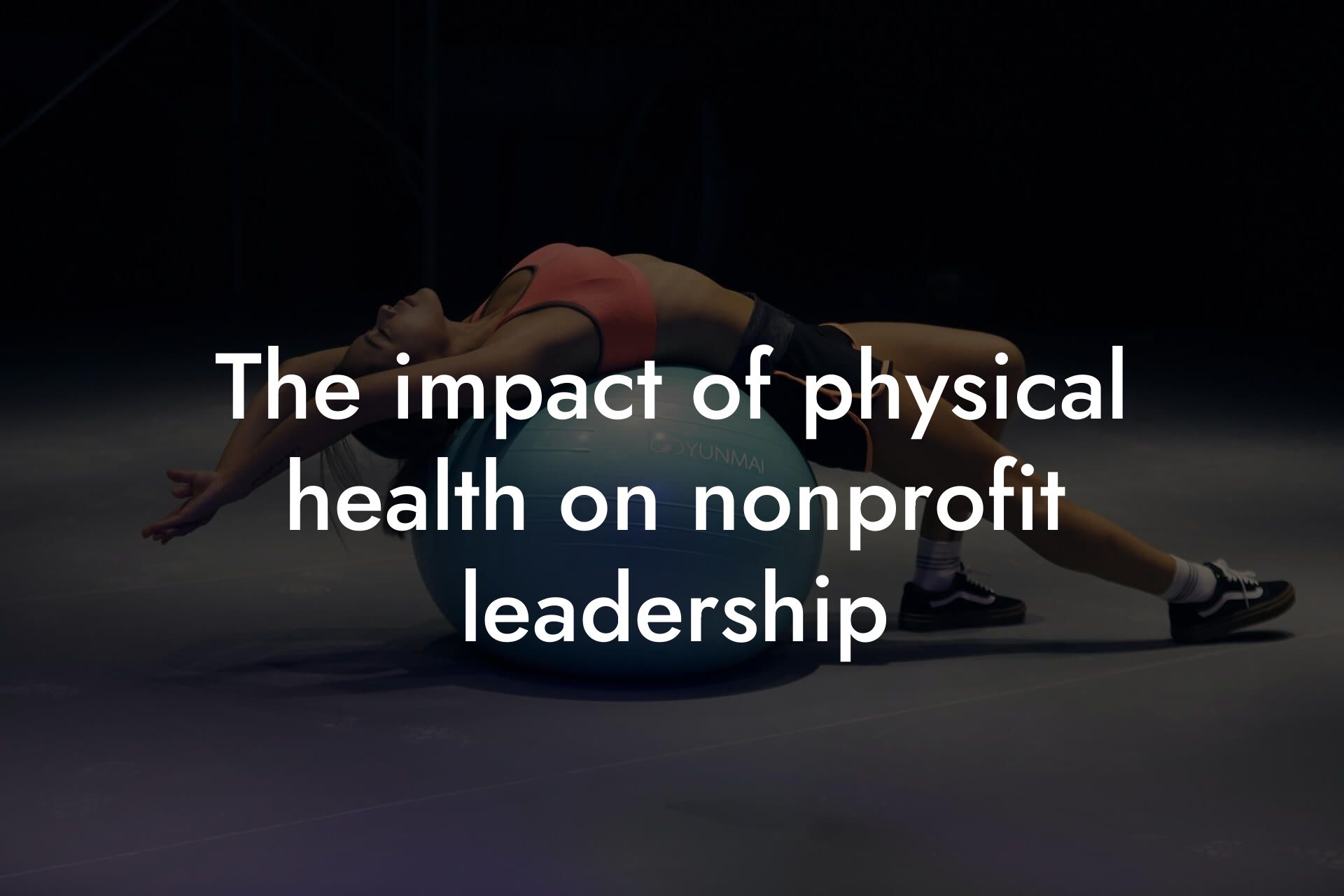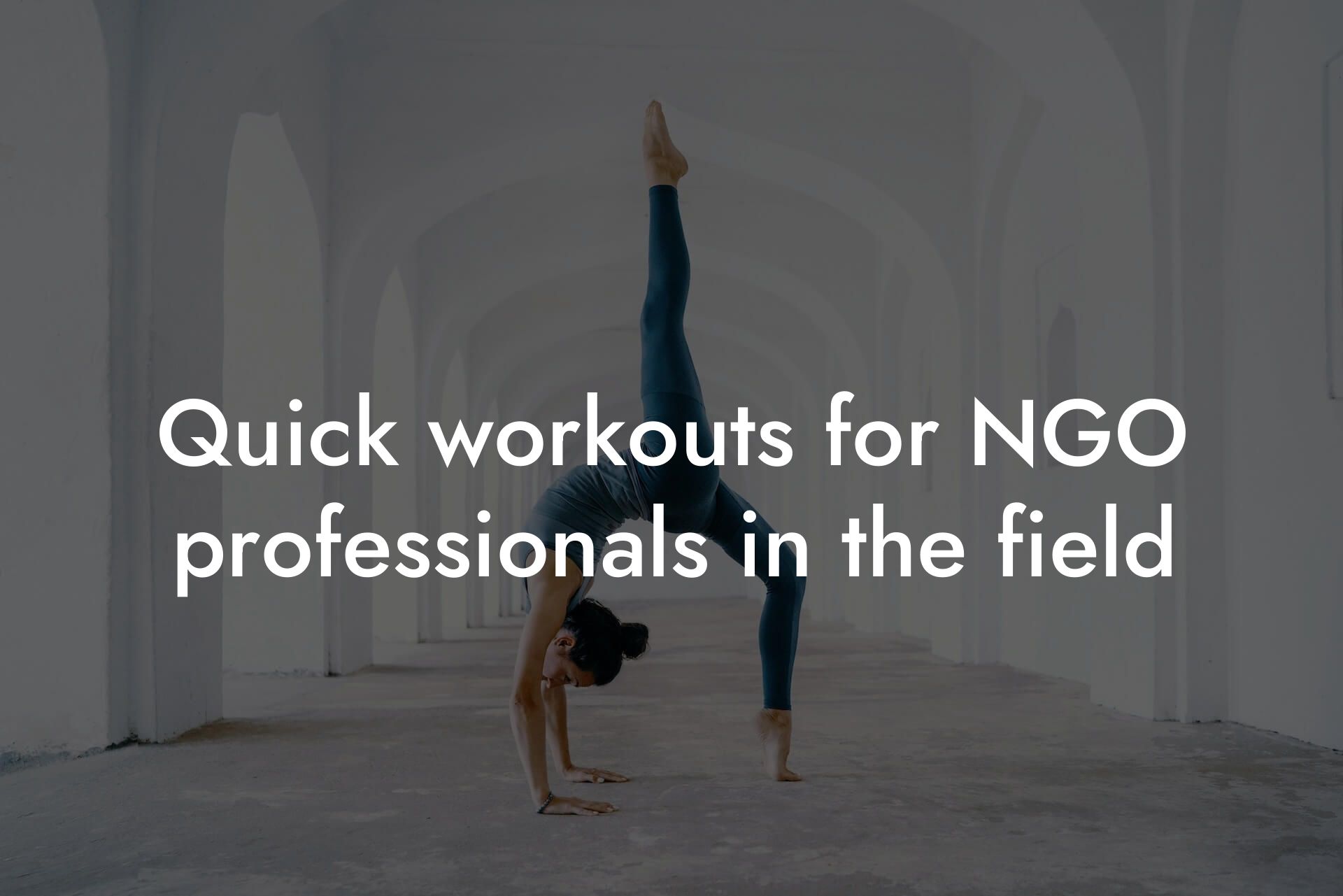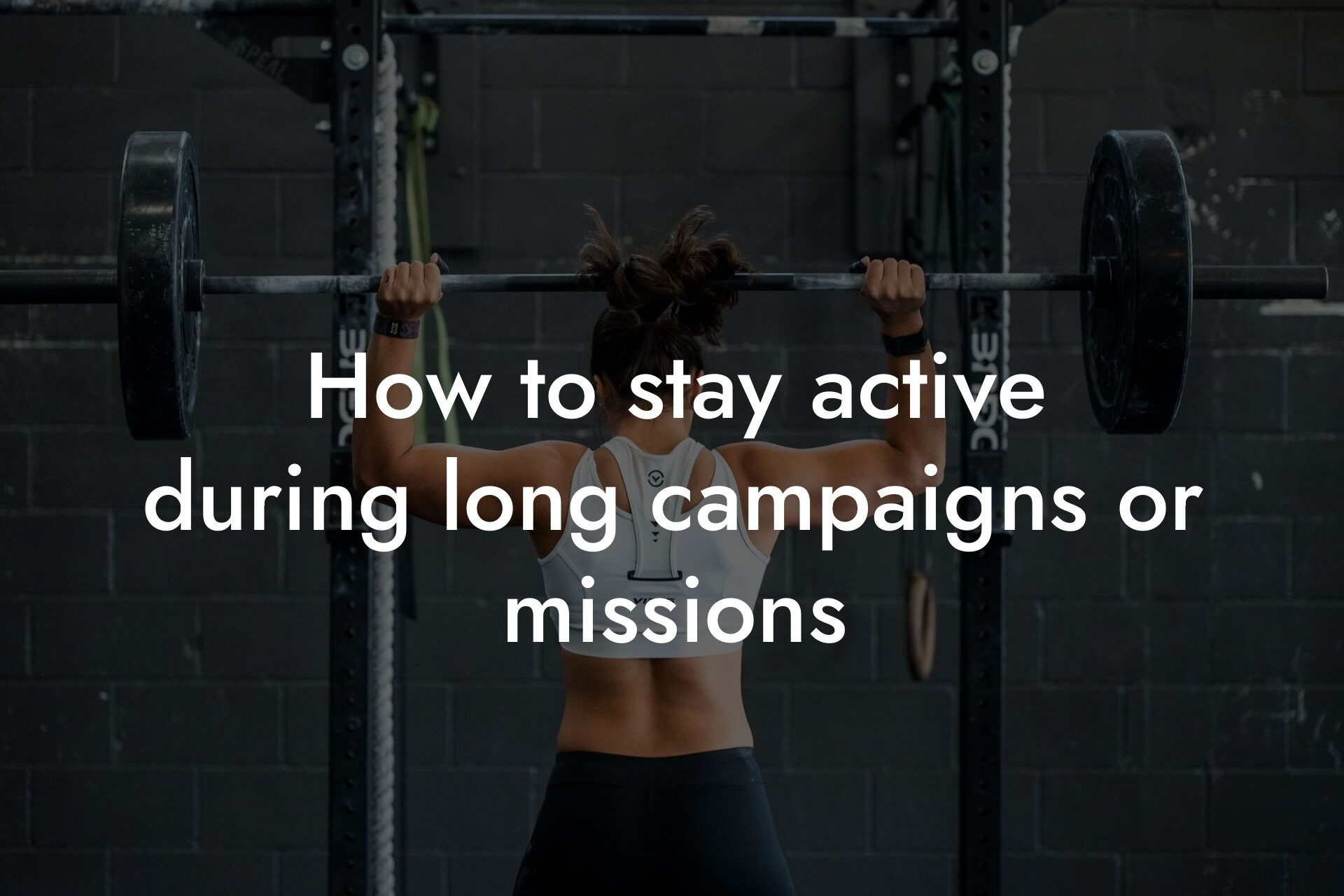Working in the nonprofit sector can be incredibly rewarding, but it can also be highly stressful. Long hours, tight deadlines, and limited resources can take a toll on both physical and mental health. However, incorporating physical fitness into your daily routine can be a powerful tool for managing stress and improving overall well-being. In this article, we'll explore the importance of physical fitness for nonprofit professionals, the benefits of regular exercise, and provide practical tips for incorporating fitness into your busy schedule.
Table of Contents
- The Impact of Stress on Nonprofit Professionals
- The Benefits of Physical Fitness for Stress Management
- Getting Started: Finding Time for Fitness in a Busy Schedule
- Types of Exercise for Stress Relief
- The Importance of Rest and Recovery
- Overcoming Barriers to Fitness in Nonprofit Work
- Frequently Asked Questions
The Impact of Stress on Nonprofit Professionals
Nonprofit professionals often face unique challenges that can contribute to high levels of stress. These may include:
• Long hours and heavy workloads
• Limited resources and budget constraints
• Emotional demands of working with vulnerable populations
• High stakes decision-making and accountability
The cumulative effect of these stressors can lead to burnout, anxiety, and depression. Chronic stress can also have physical consequences, including headaches, digestive problems, and a weakened immune system.
The Benefits of Physical Fitness for Stress Management
Regular exercise is a well-established stress-reduction strategy, and for good reason. Physical activity has been shown to:
• Reduce symptoms of anxiety and depression
• Improve mood and overall sense of well-being
• Enhance sleep quality
• Boost energy levels and reduce fatigue
• Improve focus, concentration, and productivity
In addition to these benefits, physical fitness can also provide a healthy distraction from the demands of nonprofit work, offering a much-needed break from the stress and pressure of the job.
Getting Started: Finding Time for Fitness in a Busy Schedule
One of the biggest barriers to incorporating physical fitness into a nonprofit professional's routine is often a perceived lack of time. However, it's not necessary to dedicate hours a day to exercise. Even small amounts of physical activity can have a significant impact on stress levels. Here are some tips for finding time for fitness in a busy schedule:
• Start small: Begin with short, 10-15 minute workouts and gradually increase duration and intensity as your schedule allows.
• Schedule it in: Treat fitness as a non-negotiable part of your daily routine, just like meetings and deadlines.
• Find activities you enjoy: Engage in physical activities that bring you joy, whether it's walking, running, yoga, or dancing. This will make it more likely that you'll stick to your routine.
• Incorporate incidental activity: Look for opportunities to incorporate physical activity into your daily routine, such as taking the stairs instead of the elevator or going for a short walk during your lunch break.
Types of Exercise for Stress Relief
While any type of physical activity can be beneficial for stress relief, some exercises are particularly well-suited for reducing stress and anxiety. These include:
• Yoga: Combines physical movement with deep breathing and meditation techniques to reduce stress and improve mood.
• Aerobic exercise: Activities like running, cycling, or swimming can help reduce stress and anxiety by releasing endorphins, also known as "feel-good" hormones.
• Strength training: Building muscle through strength training can improve overall sense of well-being and reduce symptoms of depression.
• Mind-body exercises: Activities like tai chi and Pilates can help reduce stress and improve mood by promoting relaxation and reducing muscle tension.
The Importance of Rest and Recovery
While regular exercise is essential for managing stress, it's equally important to prioritize rest and recovery. This is especially true for nonprofit professionals, who may be more prone to burnout due to the demands of their work. Here are some tips for incorporating rest and recovery into your fitness routine:
• Listen to your body: Pay attention to your body's signals, and take rest days as needed.
• Prioritize sleep: Aim for 7-9 hours of sleep per night to help your body recover from the physical and emotional demands of the day.
• Incorporate stretching and foam rolling: These activities can help reduce muscle tension and improve overall flexibility.
• Schedule downtime: Make time for relaxation and self-care, whether it's reading a book, taking a bath, or simply enjoying a cup of coffee.
Overcoming Barriers to Fitness in Nonprofit Work
Despite the many benefits of physical fitness for stress management, nonprofit professionals may face unique barriers to incorporating exercise into their routine. These may include:
• Limited access to fitness facilities or resources
• High levels of job-related stress and burnout
• Limited time and energy for self-care
To overcome these barriers, consider the following strategies:
• Find free or low-cost fitness resources: Look for local parks, community centers, or online fitness resources that offer free or low-cost access to fitness classes and facilities.
• Prioritize self-care: Recognize the importance of self-care for overall well-being, and make time for activities that nourish your mind, body, and spirit.
• Find a workout buddy: Having a workout partner can provide motivation and accountability, helping you to stay on track with your fitness goals.
Managing stress through physical fitness is a powerful tool for nonprofit professionals. By incorporating regular exercise into your daily routine, you can reduce symptoms of anxiety and depression, improve mood and overall sense of well-being, and enhance your ability to cope with the demands of nonprofit work. Remember to start small, find activities you enjoy, and prioritize rest and recovery to get the most out of your fitness routine. By taking care of your physical health, you'll be better equipped to make a positive impact in your community and achieve your goals in the nonprofit sector.
At Tano Performance Group, we understand the importance of physical fitness for overall well-being. Our state-of-the-art DEXA machine provides a comprehensive body assessment, giving you the information you need to take your fitness to the next level. Contact us today to learn more about how our services can support your fitness goals.
Frequently Asked Questions
What is the connection between physical fitness and stress management in nonprofit roles?
Research has shown that regular physical activity can help reduce stress and anxiety by releasing endorphins, also known as "feel-good" hormones. In nonprofit roles, where stress and burnout are common, incorporating physical fitness into your daily routine can be a game-changer for managing stress and improving overall well-being.
How can physical fitness help with stress management in nonprofit professionals?
Physical fitness can help with stress management in nonprofit professionals by providing a healthy outlet for emotions, improving mood, and increasing energy levels. Regular exercise can also help reduce symptoms of anxiety and depression, common in nonprofit professionals.
What are some common physical fitness activities that can help with stress management?
Some common physical fitness activities that can help with stress management include cardio exercises like running, cycling, or swimming, strength training, yoga, Pilates, and high-intensity interval training (HIIT). Even simple activities like walking, stretching, or dancing can be beneficial.
How often should I exercise to see benefits for stress management?
Aim to exercise at least 3-4 times per week, with a minimum of 30 minutes per session. However, even small amounts of physical activity, such as 10-15 minutes per day, can be beneficial for stress management.
What are some tips for incorporating physical fitness into a busy nonprofit schedule?
Try to schedule exercise into your daily planner, just as you would any other important task. Consider waking up earlier to fit in a morning workout, or using your lunch break to squeeze in a quick exercise session. You can also try breaking up your exercise into shorter sessions throughout the day.
How can I stay motivated to exercise regularly?
Find an exercise buddy or accountability partner to help keep you motivated. Set specific, achievable fitness goals for yourself, and reward yourself when you reach them. Also, try to focus on how exercise makes you feel, rather than just the physical benefits.
What are some common barriers to physical fitness in nonprofit professionals, and how can they be overcome?
Common barriers to physical fitness in nonprofit professionals include lack of time, energy, and resources. These barriers can be overcome by prioritizing self-care, finding free or low-cost exercise options, and seeking support from colleagues or a fitness community.
How can physical fitness improve overall well-being in nonprofit professionals?
Physical fitness can improve overall well-being in nonprofit professionals by reducing stress and anxiety, improving mood, increasing energy levels, and enhancing sleep quality. Regular exercise can also boost self-esteem and confidence, leading to a greater sense of overall well-being.
What role does nutrition play in physical fitness and stress management?
Nutrition plays a critical role in physical fitness and stress management. A balanced diet that includes plenty of fruits, vegetables, whole grains, and lean protein sources can help fuel exercise and support overall health. Avoid sugary and processed foods that can exacerbate stress and anxiety.
How can I track my progress and stay accountable with my physical fitness goals?
Use a fitness tracker, journal, or mobile app to track your progress and stay accountable. Share your goals with a friend or accountability partner, and schedule regular check-ins to monitor progress.
What are some common misconceptions about physical fitness and stress management?
One common misconception is that you need to be a "gym person" to benefit from physical fitness. Another misconception is that exercise needs to be intense or time-consuming to be effective. In reality, any amount of physical activity can be beneficial for stress management.
How can physical fitness improve my productivity and focus in my nonprofit role?
Regular exercise can improve cognitive function, boost energy levels, and enhance focus and concentration. This can lead to greater productivity and efficiency in your nonprofit role.
What are some ways to incorporate physical fitness into team-building activities in a nonprofit organization?
Consider organizing group fitness classes, charity runs or walks, or volunteer days that involve physical activity. You can also encourage team members to share their fitness goals and progress with each other, fostering a sense of community and support.
How can physical fitness support mental health in nonprofit professionals?
Physical fitness can support mental health in nonprofit professionals by reducing symptoms of anxiety and depression, improving mood, and enhancing sleep quality. Regular exercise can also increase self-esteem and confidence, leading to greater overall mental well-being.
What are some resources for nonprofit professionals looking to prioritize physical fitness and stress management?
Resources include fitness classes or personal training sessions, online workout platforms, and mobile apps that track progress and provide motivation. You can also seek support from colleagues, friends, or a fitness community.
How can physical fitness improve my overall quality of life as a nonprofit professional?
Physical fitness can improve overall quality of life as a nonprofit professional by reducing stress and anxiety, improving mood, increasing energy levels, and enhancing sleep quality. Regular exercise can also boost self-esteem and confidence, leading to a greater sense of overall well-being.
What are some tips for getting started with physical fitness as a nonprofit professional?
Start small, with short, manageable sessions, and gradually increase intensity and duration. Find an exercise that you enjoy, and schedule it into your daily routine. Don't be too hard on yourself if you miss a session – simply get back on track as soon as possible.
How can physical fitness support my long-term career goals as a nonprofit professional?
Physical fitness can support long-term career goals by improving energy levels, focus, and productivity, leading to greater success and advancement in your nonprofit role. Regular exercise can also enhance overall well-being, reducing the risk of burnout and increasing job satisfaction.
What are some common mistakes to avoid when starting a physical fitness routine as a nonprofit professional?
Avoid trying to do too much too soon, which can lead to burnout or injury. Don't compare yourself to others, and focus on your own progress and goals. Also, avoid using exercise as a way to punish or deprive yourself, and instead focus on the positive benefits it brings to your life.
How can physical fitness support my overall health and wellness as a nonprofit professional?
Physical fitness can support overall health and wellness by reducing the risk of chronic diseases, improving sleep quality, and enhancing cognitive function. Regular exercise can also boost immune function, reducing the risk of illness and infection.
What are some ways to prioritize physical fitness and self-care in a high-stress nonprofit environment?
Prioritize physical fitness and self-care by scheduling it into your daily routine, just as you would any other important task. Communicate your needs to colleagues and supervisors, and seek support from a fitness community or accountability partner.
How can physical fitness improve my relationships with colleagues and clients as a nonprofit professional?
Physical fitness can improve relationships with colleagues and clients by increasing energy levels, improving mood, and enhancing focus and productivity. Regular exercise can also boost confidence and self-esteem, leading to greater success and effectiveness in your nonprofit role.
What are some tips for maintaining a physical fitness routine while traveling or working remotely as a nonprofit professional?
Find ways to stay active, such as bodyweight exercises or short walks, even when you're away from your usual routine. Pack a fitness tracker or resistance bands to keep you motivated and on track. You can also try online workout classes or mobile apps that provide virtual fitness support.
Here are some related articles you might love...
- The impact of physical health on nonprofit leadership
- Quick workouts for NGO professionals in the field
- How to stay active during long campaigns or missions
- The role of physical health in effective advocacy
- The connection between fitness and nonprofit impact
- Balancing mission-driven work with personal fitness
- How DEXA scans can benefit nonprofit professionals
- Nutrition tips for maintaining energy during fundraising events
- How nonprofit workers can stay fit during demanding schedules
Zak Faulkner
Zak Faulkner is a leading authority in the realm of physical health and body composition analysis, with over 15 years of experience helping professionals optimise their fitness and well-being. As one the experts behind Tano Performance Group, Zak has dedicated his career to providing in-depth, science-backed insights that empower clients to elevate their physical performance and overall health.
With extensive knowledge of DEXA technology, Zak specializes in delivering comprehensive body assessments that offer precise data on body fat, muscle mass, bone density, and overall physique. His expertise enables individuals to make informed decisions and achieve their fitness goals with accuracy and confidence. Zak’s approach is rooted in a deep understanding of human physiology, combined with a passion for helping clients unlock their full potential through personalised strategies.
Over the years, Zak has earned a reputation for his commitment to excellence, precision, and client-focused service. His guidance is trusted by top professionals who demand the best when it comes to their health. Whether advising on fitness programs, nutritional strategies, or long-term wellness plans, Zak Faulkner’s insights are a valuable resource for anyone serious about taking their health and fitness to the next level.
At Tano Performance Group, Zak continues to lead our Content Team revolutionising how professionals approach their physical health, offering unparalleled expertise that drives real results.




